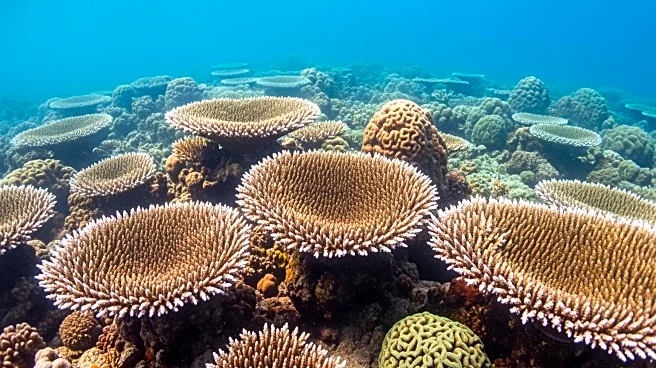What's Happening?
Recent research published in Nature suggests that some ancient stony corals have demonstrated resilience to extreme environmental changes, indicating that certain modern species might also withstand the
impacts of climate change. The study, led by Claudia Vaga and colleagues, involved sequencing the genomes of 274 stony coral species, representing nearly 16% of currently living species. The research aimed to reconstruct the evolutionary tree of these corals, dating their most recent common ancestor to approximately 460 million years ago. This ancestor was likely a heterotrophic organism capable of living in both shallow and deep waters. The study highlights that while many symbiotic coral species became extinct during past ocean anoxic events, some non-symbiotic species persisted and even diversified, suggesting potential resilience to current and future environmental changes.
Why It's Important?
The findings of this study are significant as they offer hope for the survival of coral species amidst the ongoing threats posed by climate change. Stony corals are vital to marine ecosystems, providing habitat and protection for numerous marine species. Understanding their historical resilience could inform conservation strategies aimed at protecting these ecosystems from further damage. The study's insights into the evolutionary adaptability of non-symbiotic corals could guide efforts to enhance the resilience of coral reefs, which are crucial for biodiversity, coastal protection, and the livelihoods of millions of people worldwide. The potential for some coral species to survive and adapt to changing conditions could mitigate the broader ecological and economic impacts of coral reef degradation.
What's Next?
Future research may focus on identifying specific traits that contribute to the resilience of non-symbiotic stony corals, potentially leading to targeted conservation efforts. Scientists and conservationists might explore breeding programs or habitat restoration projects that leverage these resilient traits to bolster coral populations. Additionally, policymakers could use these findings to prioritize funding and resources for coral conservation initiatives. As climate change continues to pose a significant threat to marine ecosystems, understanding and enhancing the resilience of coral species will be critical in preserving these vital habitats.
Beyond the Headlines
The study also raises questions about the ethical and practical implications of human intervention in natural ecosystems. While enhancing coral resilience through scientific means could offer immediate benefits, it also prompts discussions about the long-term sustainability of such interventions. Balancing human efforts to protect coral reefs with the natural evolutionary processes of these species will be a key consideration for researchers and policymakers alike.








